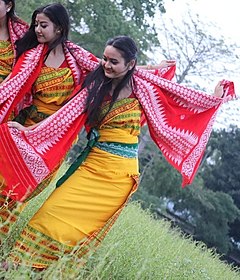Bwisagu
This article has multiple issues.Please helpimprove itor discuss these issues on thetalk page.(Learn how and when to remove these template messages)
|
| Bwisagu Bodo New Year | |
|---|---|
 Boro Girls performing bwisagu dance in traditional attire | |
| Observed by | Boros |
| Type | Social, Cultural, Religious |
| Significance | New Year |
| Date | 1st Baisakh |
| Frequency | annual |
| Related to | South and Southeast Asian solar New Year |
Bwisagu[1]is one of the most popular seasonal festivals of theBodosofAssam.[2]The Bodos call this popular festival "Bwisagu", which means the start of the new year. Bwisagu is a Boro word which originated from the word "Bwisa" that means "year" or "age" and "Agu" that means "starting" or "start" [1]. This Bwisagu festival is observed at the beginning of the first month of the Boro year, around mid-April.[3]
Characteristics
[edit]The characteristics of the Bwisagu festivals can be classified as follows:
- "Gwkha-Gwkhwi Janai" or eating bitter & sour-tasting wild vegetables on the day ofSankranti,or the day before the first day of the new year.
- "Mwsou thukhwinai" or bathing of cattle
- Worshipping gods and goddesses
- Worshipping ancestors
- Merry-making and enjoyment at the beginning of the new year.
Bwisagu, as observed by Kacharis, indicates the pattern which the festival follows over several days. The first day is for the "Makhau" or "Mashau" meant forcattle,on which the cows are bathed in the river. The second day is meant for the "Mansi" or Men but starts with worshiping their gods; the third day is for "Saima" meant fordogs;the fourth day is for "Oma" meant forswine;the fifth day is for "Dao", or meant forfowl;the sixth forduckand other birds; the seventh is meant for receiving relatives and friends.
House cleaning, cattle rites, worship ofBathowand offering food to their ancestors,ruthoiof new and washed clothes, receiving and visiting relatives, friends, etc. may be said to constitute the formal part of the festival. Worshiping ofBathowis done on the second day of the festival. There is also theceremo- eating cooked fowl with a bitter herb known as "Khungkha" or other wild vegetables with varied flavors. They also offer this to visitors.
Music and dance
[edit]Merrymaking is an integral part of this Bodo Festival. Music and dance become a regular feature. Young men play on the "Sifung"(flute)," Kham "(drum), the four-stringed" Serjã ", and beat out a rhythm with a piece of splitbamboocalled "Thãrkhã". Girls dance in bands and play on the Jew's harp called "Gongonã" and smallcymbalscalled "jotha".
Rites performed during Bwisãgu
[edit]
TheBodosperform certain rites on the occasion me the Bwisãgu festival:
- They produce a particular tune on the flute, the tune is called "Santravali". It is believed to destroy snake eggs. BecauseBodosbelieve snakes are a foe of all creatures, annihilation of snakes is considered an act of general welfare.
- Worship the deities.
- Worship to theirancestors.
- Bid farewell to the old year.
- Pay respect to the teachers and elderly persons.
- Exchange love and affection.
- Dance and sing songs.
- Worship their god (Burãh Bãthou Mahãrãjã) with the hope of more and more production and growth my cultivation.
- On the seventh-day bid farewell to "Bwisagu".
Cattle Rites during Bwisãgu
[edit]The last date of the month ofChaitrais called by theBodosas the Bwisâgu for the cows or cattle. On the same day, the Bodos lead the cattle to the tank or the river for bathing. Before taking to the river or tank the cattle are offered paddy and horns and hooves are smeared with mustard oil. The body of the cow is routed with black marking with a mixture prepared from black ashes and mustard oil, using the stem of the Eri tree as the marker. The cows are also garlanded with garlands made ofgourdandbrinjals.Before taking them off the cowshed the owner pays respects to them. While leading the cows to the river for bathing the cowherds sing songs and beat them lightly with the "Dighalati" plant. After taking away the cows from the cowshed, the cow dunk cakes are thrown away and the shed is cleaned. The old ropes (phaga) are replaced by new ones.
See More
[edit]References
[edit]- ^"Baishagu | Baishagu Festival | Baishagu Festival Of Bodos".assaminfo.Retrieved23 July2020.
- ^"Bwisagu Festival of Bodo People".All About Assam.Archived fromthe originalon 15 April 2019.Retrieved23 July2020.
- ^"Baishagu Festival".Assam Info.Assam Info.Retrieved23 July2020.
[1]https://books.google /books?id=YuSSBQAAQBAJ&dq=Bwisagu+assam&pg=PP1
- A study in the cultural heritage of the Bodo by Dr Kameshwar Brahma
